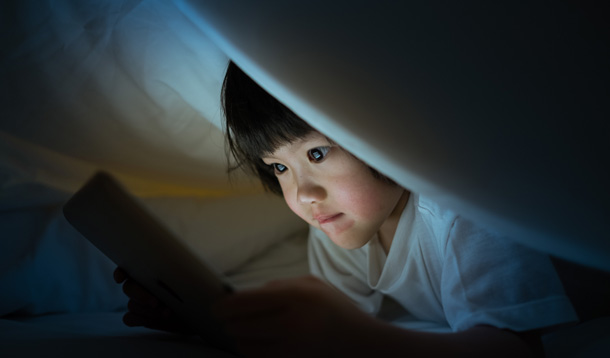Tips To Help Your Child Cope-Up With Screen Time Stress
Smartphones, play stations, gaming systems, and screens are almost everywhere. Have you ever considered how much time your child is spending on screen? While these gadgets are used for both learning and entertainment purposes, the time children are spending has become worrisome for parents. In the present times, when the world has shifted to virtual platforms, it is imperative that you and your child have to get acquainted with online engagement. But we need to make sure that they are not becoming more dependent on screens. Even though apps and the internet promise to provide abundant learning tools, games, and other resources, there is very little evidence that they are actually beneficial to a young child’s cognitive development. Many studies have shown that excessive exposure to screen time is associated with attention and learning problems, lower academic performance, negative behaviors in children, and lifestyle issues such as obesity and related problems.
Apart from these major issues, excessive screen time can cause the following problems in your child:
- Neck pain
- Headache
- Digital eye strain, dry eyes
- Sleep disturbances
- Behavioral changes like irritability, refusals, and excessive arguments
- Impaired socializing skills
So, here are a few tips that can really help every parent to limit screen time and keep their child happy and healthy.
1. Set The Example.
Kids are very perceptive. They watch every step of parents. So, parents must follow house screen rules before they discipline their children. If you have passed a rule that no watching TV or phones during meal time, that means Mom and Dad shouldn’t be pulling out their phone to check either. Research shows that children act out for more attention to their parents who are, more absorbed in their own devices. In order to help your child be more aware of the real world, you need to give them opportunities to explore their community but with strict adherence to safety and COVID protocol. Plan for outdoor activities like biking, swimming, sports, or camping to teach your kid new skills.
2. Follow Screen time plan:
When you notice your child complain of dry eyes, itching, burning sensation in the eyes, these can be symptoms of digital eye strain. In some cases, severe eye strain may cause migraines and vision problems like myopia and astigmatism. Teach your child about how to protect eyes from screen damage. Tell them that the eyes will get better when you give them a break. Teaching your child the 20-20-20 rule can help their eyes to rest intermittently. Ensure that your kid takes a 20-second break every 20 minutes to look at something 20 feet away. Using artificial tear drops upon medical supervision may help in relieving the dryness and itching of the eyes. Make sure that your child gets an annual eye examination for checking and correcting the refractive errors
4. Don’t let screens disturb your child’s sleep pattern:
Blue light suppresses the body’s release of melatonin, a hormone that induces sleep and can interrupt sleep patterns and circadian rhythms of your child. So make sure that they don’t carry screens to their bedroom.
5. Control the behavioral changes:
In most children, excess screen time and reduced interaction with family and friends has shown to affect their behavior. Such children may develop behavioral changes such as poor attention span, not listening when spoken to, arguing excessively or throwing age-inappropriate tantrums. To avoid such changes, parents should engage in interesting and useful activities that stimulate the child’s curiosity. Encourage your child to learn activities such as sports, music and art to help them reduce stress and keep up good mental health.
6. Monitor the content your child is watching:
Make sure that you protect your child from watching explicit content. Set parental controls and keep an eye on what your children are viewing online as they can become violent or aggressive. Do not allow your child to watch TV or use a mobile phone while in their bedroom. Help your child understand the dangers of harmful content. Sit with them and explain to them how playing violent games, or watching violent movies can rob their peace of mind. Don’t ever encourage your child to indulge in social media at an early age as it can do more harm than good.
Wrap up:
It is important for every parent to encourage children to have a healthy balance between passive screen time, which means watching on-screen, and interactive screen time, which means creating content or playing games online. Remind your child that it is equally important to keep screen time and time in the real world well balanced. Try any kind of positive activities that can replace screen time. If you find that it is getting difficult to control your child’s screen time and its negative impacts on your child, then it’s advisable to meet a therapist. Psychotherapists can help fix behavioral problems in your children by following remedial actions to help them get better. Psychotherapy Partners in Minneapolis is a leading counseling center that has the best team of experts to address any psychological issues and provide the best solutions for your well-being.










Leave a Reply